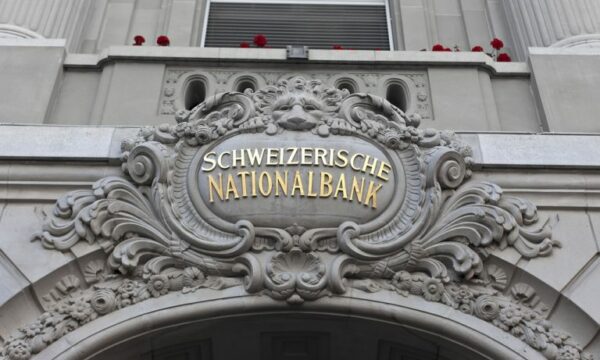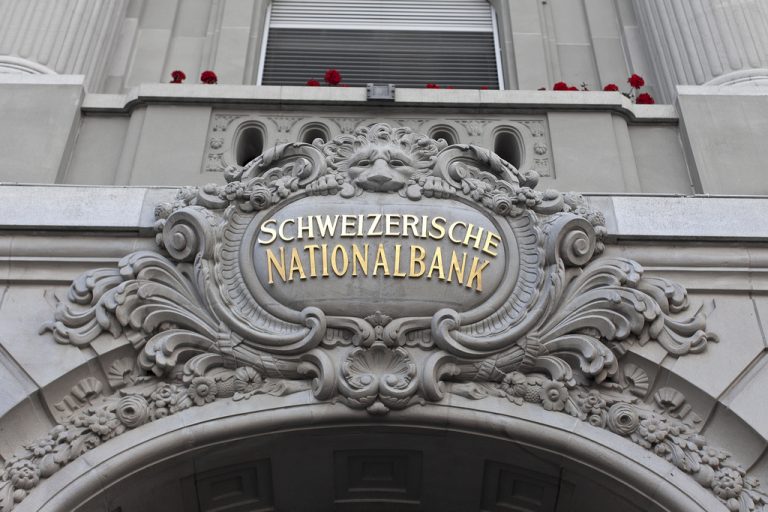How protected is the Swiss National Bank compared to the US Federal Reserve?

The independence of the Swiss National Bank (SNB) is enshrined in the constitution, a protection that its American counterpart does not enjoy. But where does this concept come from and how does Switzerland compare internationally?
US President Donald Trump has made no secret of his views on the decisions made by the Federal Reserve. He has not only exerted public pressure, but has also temporarily appointed one of his closest economic advisers, Stephen Miran, to the seven-member Board of Governors of the Federal Reserve System (FED).
Many experts are concerned by Trump’s behavior. “These actions are undermining the norm of central bank independence,” Carolina Garriga of the University of Essex told Swissinfo. “But this is no different from the effect of other actions that undermine other democratic and technocratic institutions and norms, unfortunately.”
However, while the independence of the American judicial system is enshrined in the US constitution, the same cannot be said for the country’s central bank.
Where does central bank independence (CBI) come from?
Granting central bank independence is a relatively new concept. It emerged as a response to inflationary trends after the end of the Bretton Woods system. The norm of independent central banks spread during the 1980s and 1990s. In Switzerland, the Swiss National Bank has been enshrined in the country’s constitution since 1999.
“In the 1980s, many central banks were effectively part of their finance ministries – 20 years later, most had created a more or less independent structure,” says lawyer Hans Kuhn, who headed legal services at the Swiss National Bank from 2001 to 2014.
Why did this happen? The root cause lies in economic research. “A large number of economic studies have empirically shown a negative correlation between the Swiss National Bank and inflation,” Kuhn explains. In other words, independent central banks are intended to keep prices stable, regardless of a potentially short-sighted government. Even if the political landscape changes.
Garriga also points this out in a recently published academic article. Garriga’s data on the independence of central banks around the world reveals how differently the norm is applied across countries. In countries such as India, as well as Japan and Australia, central banks are not legally independent, albinfo.ch reports.
In countries such as Belarus, Venezuela and Turkmenistan, but also in democracies such as Ecuador, Garriga has observed “significant restrictions” on independence since the turn of the millennium. According to her data, the CBI has also worsened in China and Indonesia.
What are the democratic criticisms of the CBI?
Recent events in the US have brought more attention to critics who see the concept of central bank autonomy as undemocratic.
One such critic is political theorist Leah Downey, who questions the idea that the CBI leads to price stability. The empirical evidence, she argues, is “more mixed than is commonly accepted,” and the data behind many of the often-cited studies are limited. Downey also notes that arguments in favor of independence effectively assume “that monetary policy is unique,” unlike any other policy area. For her, the complexity of monetary policy is no reason to grant experts “autonomy over policy.”
Downey also believes that, in the long run, the CBI undermines “the health of democracy.” She argues that monetary policy should continue to be “conducted by a central bank full of experts and stakeholders that is under the active management of the legislature.”
At the same time, Downey sees Trump’s actions as “clearly undemocratic.” If Trump truly wanted to democratize monetary policy, he would have taken the issue to Congress, she says.
The concentration of power in the hands of a single individual is also unconstitutional. “The framers of the U.S. Constitution clearly gave budgetary powers and the power to print and regulate money to the legislature, not the executive,” says Downey.
What is the situation in Switzerland?
The independence of the Fed is enshrined in American law. In Switzerland, however, nearly 60% of eligible voters approved the new federal constitution in the spring of 1999, thus – consciously or not – supporting the independence of the SNB. Article 99 states that “as an independent central bank, the Swiss National Bank shall pursue a monetary policy that serves the general interest of the country.” The Swiss authorities are responsible for “cooperating with and supervising” its administration.
In Switzerland, any change to the constitution must be put to a nationwide vote. This means that – if the political landscape changes – it will be more difficult for the government and parliament to challenge the central bank’s independence than in the US. Economist Ernst Baltensperger describes this to Swissinfo as a “much higher democratic hurdle”. Even more crucial, he argues, is the element of “self-commitment”. According to him, both parliament and the people feel obliged to support the principle of the CBI.
In Switzerland, an 11-member Banking Council oversees the work of the SNB, a joint-stock company with a majority shareholding of 26 cantons. Five members of the council are elected by the general assembly, while six are appointed by the government. Banking Council members are expected to represent science, business and politics and have a background in economics.
At the moment, for example, the council includes a finance professor and the president of Switzerland’s largest union. As a supervisory body, the Banking Council proposes new board members to the government when changes arise. The government then appoints them for six years, which is longer than a parliamentary term.
Is the SNB a democratic institution?
Does this make the SNB an institution of Swiss democracy? Hans Kuhn, the former head of the SNB’s legal services, says: “Article 99 gives it great power. However, its structure is regulated by law. There is accountability and there is a tension that needs to be understood and carefully balanced.”
Above all, Kuhn believes that CBI is “widely accepted and respected.” “The respect is strong, sometimes excessive. I often feel that people are hesitant because they don’t fully understand the subject,” he says.
However, many motions in the Swiss parliament affect the SNB. At the end of 2024, the business federation economyssuisse presented its analysis of the “Swiss Trump moments.” According to the study, all political parties have initiated motions related to the SNB since 2014, with the majority coming from the left. About 15%, the study says, addressed the bank’s mandate and just under a third focused on its balance sheets. How many of the motions were successful is unknown, economyssuisse told Swissinfo.
Kuhn takes a nuanced view when parliament and the political public debate how the SNB’s profits should be used. “It is not forbidden to think about the SNB,” he says. “But its core mandate should not be interfered with.” He adds that any interference with interest rates by parliamentarians would be particularly delicate.
“Compared to the US, the SNB is a powerful and slow institution,” says Kuhn. The Fed, he explains, does not have a banking council to propose candidates. If a Swiss government were critical of the SNB and wanted to replace its leadership, the process would be quite slow.
How could recent developments in the US affect the world?
“In the US, this can happen very quickly,” says Kuhn, citing the frequent disregard for social conventions. “When political actors disregard these norms, they can quickly damage these fragile structures.” He believes that Stephen Miran – unlike the other two Fed governors appointed by Trump – does not have the economic skills required by law.
Kuhn finds it difficult to predict the ripple effects of Trump’s actions, but he “believes that reason will prevail.” He believes that many countries will continue to support the CBI rate and has high hopes that other countries, even when it comes to tariffs, have not resorted to retaliation. Trump is certainly not the first head of state to put pressure on a central bank. Former Japanese Prime Minister Shinzo Abe did the same with the Bank of Japan in 2013.
However, when the US government puts pressure on the Federal Reserve (FED), the consequences can affect the entire global economy. “The dollar is the global anchor currency,” says Kuhn. “If the value of the anchor falls, the risks are great.”/Albinfo.ch

